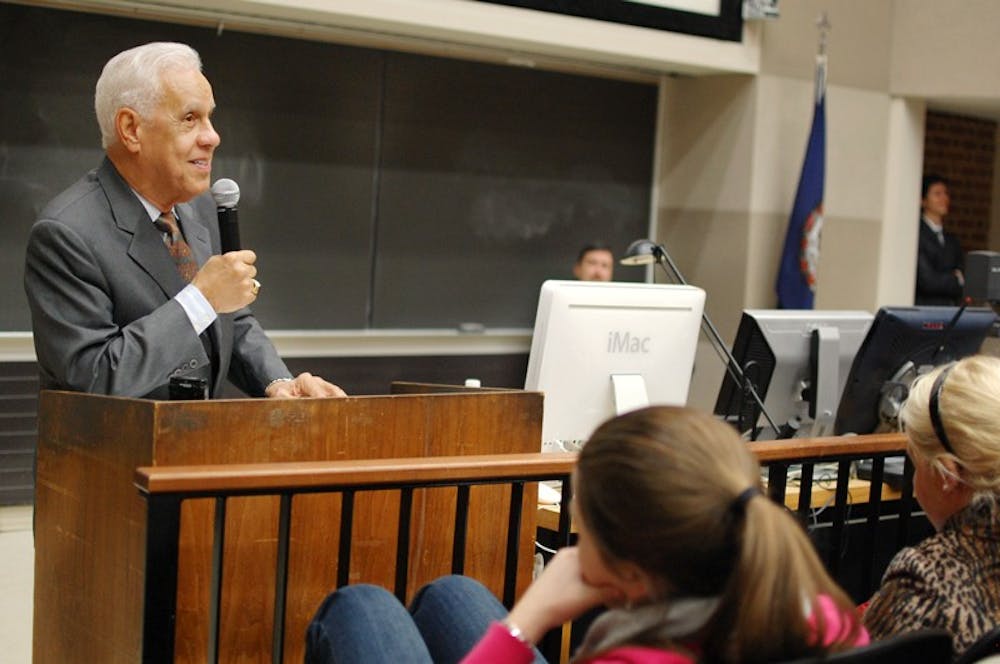Former Gov. Douglas Wilder, the first black governor in the United States, spoke yesterday to students in Politics Prof. Larry Sabato's introductory government class.
Wilder was born in Richmond, a grandson of slaves who ultimately attended Virginia Union University and Howard University Law School. He eventually became a prominent figure in Virginia politics, serving as a state senator and as lieutenant governor before becoming the 66th governor of Virginia in 1990.
"Governor Wilder's story is especially inspiring," according to an e-mail statement from Sabato, who is known for inviting prominent speakers to talk to his class. "Held back by Jim Crow laws and forbidden from attending the University of Virginia because of his race, he went on to become the first elected African-American governor of any state in U.S. history. Without the successes of people like Doug Wilder, there would have been no President Barack Obama."
During his speech to the class, Wilder discussed many issues, including his accomplishments as governor, his stance on gun control, his opinions about issues faced by the Obama administration and his views on the future of Virginia.
The former governor highlighted many accomplishments that he was particularly proud of from his four-year tenure in office. For example, his administration installed a "rainy day" fund and passed the "one gun a month" law, which limited gun sales within the commonwealth. This law, which does not apply to sport-shooting rifles, was designed to prevent the large-scale gun trafficking that had become a problem in Virginia.
Before this law was passed, many crimes in the northeastern United States were carried out with weapons purchased in Virginia, which was known as "the gun capital of America," Wilder said. Such crimes decreased greatly after the passage of the law, he said, adding that violence in Virginia also dropped dramatically at the time. Without the law, the state was in a way not carrying out a civic responsibility, he added.
"We had not been proper stewards of the constitutional right to bear arms," Wilder said of Virginia's policy before passing the law.
Wilder's opinion about gun control is particularly relevant at this time because the state legislature has been debating whether to repeal the law he instituted. Nevertheless, Wilder said he still firmly supports the policy.
"No one will ever convince me that the reasonable and constitutional legislation we passed in 1993 wasn't right for the commonwealth and still is," he said.
A repeal of the law would send a message to criminals that Virginia is once again open for gun trafficking, he said. Additionally, he said he firmly believes that a repeal would cause "a wholesale escalation" of gun use within the community.
As a result, Wilder said he is hopeful that citizens will support the law against any attempts to repeal it.
"With public distrust of government growing and cynicism increasing among the people, we have an obligation to assure that our laws should not be changed for light and transient reasons," he said.\nIn this vein, Wilder suggested that President Obama should ensure that his constituents are aware of the rationales behind his legislative agenda and policy.
"The president needs to show that he is listening first of all to the people that elected him, that he promised that change, that he promised that hope, then show that you are listening to the American people today, because you represent them," Wilder said.
He also said the amount of time the president has spent focusing on health care has caused him to "drift" a little. The administration might benefit from some additions to staff, Wilder said, but mostly to gain additional points of view, not to remove any current staffers.
Although the Obama administration may be facing its share of problems, Wilder stressed that the president only has been in office one year and that he has made significant strides. Wilder added to his discussion of national politics by offering his views on Virginia's future. He said he "thinks Virginia is going up," noting that the commonwealth is looked upon as a leader among the states, as well as one that has recently been recognized many times in Washington. He said, for example, that Virginia played a pivotal role in the last presidential election, as it was one of the swing states that ultimately supported Obama.
After listening to Wilder's speech, first-year College student Sheridan Fuller expressed his admiration for the former governor. Not only is Wilder passionate about gun control and crime, Fuller said, but he also is deserving of respect on a personal level.
"He really is a passionate man about what he does," Fuller said. "He seems very grounded and really seems close to his family."
First-year College student Jessica Shenk also said she was impressed with Wilder.
"To me, he seems kind of like the common man," she said. "He's outspoken yet reserved. It seems he gives everybody a chance and he wants the American people to give everybody a chance. He tells it how it is and is blunt. He's critical yet constructive."
Throughout his speech, Wilder emphasized the power of the people in politics. When asked what he has learned during his career, he said one important thing is to emphasize a personal approach.\n"Always listen to the people, never forget what you said you would do, never forget what they wanted you to do, and understand that you are there to represent them, not yourself," he said.
The general populace, in fact, can play a very important role in politics, Wilder said, ending his speech by urging students to become involved in the political process.
"Make the demands yourselves, hold your elected officials' feet to the fire, insist they do what you ask them to do, and if they don't, boot them out," Wilder said.
-Stephanie Dodge and Radina Belberova contributed to this article







